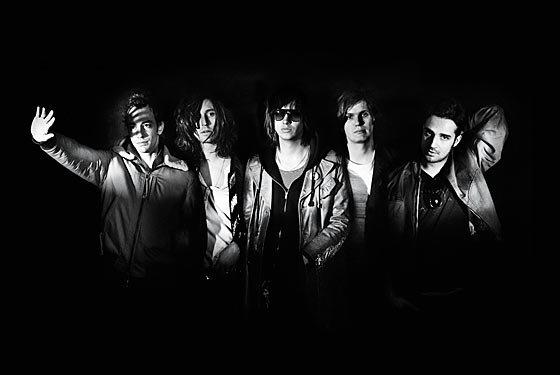
Many Strokes fans associate loving the band with being young—those sunny collegiate or teenage years, 2001 to 2004, when their first two albums seemed like an ideally breezy, effortlessly stylish guitar-band lark. So it’s fitting that the group’s current state mirrors, in nearly every detail, the malaise that swamps some people’s twenties: the sullen aimlessness; the joyless trudging through routines; the sense that you should be doing something important with your new freedoms and resources, but not knowing quite what that thing is, and thus feeling as if all your attempts at growth were awkward and miscalculated. (That last bit, in the Strokes’ case, would be represented by their bombastic, self-consciously “complex†2006 album First Impressions of Earth—even the title was trying hard.) Then maybe there’s the part where your peers accomplish more than you do (like the White Stripes did), or you Ârealize you have to stop drinking if you want to get any real work done (as front man Julian Casablancas did), or you get fed up with whichever longtime friends you were so inseparable from during those sunny-lark days. If the Strokes’ new album, Angles, feels like a “comeback,†that’s because they spent the past half-decade very casually not wanting to make music with one another.
As it happens, the driving creative force behind the Strokes was always Casablancas—to an extent that the other members now get really vague and diplomatic when asked if they’d describe his role as “dictatorial.†This fact will never cease to amaze, since Casablancas’s public demeanor is that of a guy who, if he’d been at Pompeii, would have been found slouched against a pillar, sulking or giggling, a carafe of wine in one hand, indifferent to the volcano.
For this album, he tried something that sounds more like the recommendation of a therapist than of someone interested in selling records: He went elsewhere while the band’s four other members recorded most of it on their own. Hence the title, Angles—they’ve each got their own, see? This isn’t a comeback; it’s a reconciliation. And the hope, for fans, would be that the band once billed as a restoration of nicotine-stained downtown-NYC cool might restore nothing more complicated than its own turn-of-the-century heyday.
That’s not exactly the result. The early Strokes managed to evoke about 200 separate rock bands from between 1977 and 1982, then added a loose-swinging romanticism that kept their music from feeling like pastiche. The broad scatter of ideas on Angles actually sounds more like a rained-out beach-movie soundtrack from a few years later, one with songs by the Police, the Cars, Cheap Trick, and Men at Work—it’s as if the band had nudged up, ever so slightly, from a grittier and simpler era to the one where people rolled up their blazer sleeves, shot for synth-streaked atmosphere, and started acting like relaxed, sophisticated adults. The Strokes aren’t aiming for grandeur, though: They just wander off, gamely and pleasantly, after each different sound.
All those “angles†make for a whole that is messy and chock-full of iffy ideas and dead spots. The individual Strokes might feel the same way about the parts they didn’t contribute; that’s the peril of democracy. This sounds like an album designed by a committee that met rarely, occasionally slept through the proceedings, and tried very hard to be agreeable—or else a band for whom relearning to work together was legitimately more important than results.
The one great thing about Angles is that the Strokes, so beloved for their sense of ease, seem to have that back again, as if they’d stepped aside and let this weird little record take shape on its own. There’s an intimacy and an honesty to that, which some fans will surely appreciate. Besides which, it sounds exactly like the unvexed, one-day-at-a-time spirit most people recommend for breaking out of a flailing malaise, to find contentment in whatever they’ve got.
Angles
The Strokes.
RCA. $12.99.